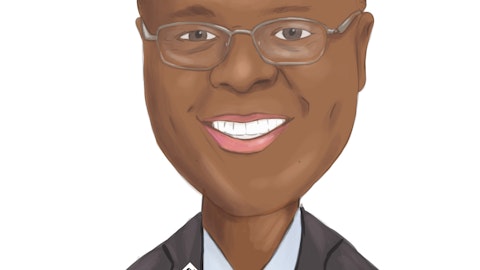Scott Wylie: Yes. Great two small questions. Let me start with the acquisition pipeline. So I think what you hear out there is what we see, which is that it’s a difficult time for acquisitions. I think with challenges with AOCI and with credit uncertainty, whatever, it’s the hard time to get things done. We continue to spend time and effort on our corporate development program. I explained many times before, that we think that, that’s a core competency here in that we have a process for doing that, and we continue our process people that we’re interested in. Now we’re interested in them. We call on them and visit with them and work on opportunities and we continue to do that. I would say there have been 2 or 3 deals in the latter half of last year that were of interest to us, and we’re just priced in a range of them make any sense to us, and they did ultimately find a buyer at a price much higher than we would have paid.
And so I wish them well. I think that’s interesting. But we don’t need to do those things. We don’t need to scratch on those things. I mean I hope as investors, you guys see that we’re disciplined about that stuff. If you look at our last 3 or 4 or also a team for that matter, acquisitions here, they’ve had very happy stories because we’re disciplined about how we look at it, how we price them and we don’t stretch on these things and do things that can come back and bite the shareholders. So are we going to do something this year? I don’t know. We don’t have anything that we’ll be announcing tomorrow, but we continue to do our corporate development efforts. And if the right thing at the right price makes sense, we would love to include that as part of our growth story going forward.
The second question, think about Teton systems. I don’t know how far Julie we should go with this whole thing. But let me try a specific answer and a general answer and maybe if you want to add some more color to it, you would. But as an industry, private banking has a really difficult problem, which is we need our trust and our investment and our mortgage and our banking systems to talk to each other and they just don’t. There’s no vendor out there that has provided that in the 40 years that I’ve been doing this, even though some of them promise it, they don’t work. And so what we’ve done historically here at First Western is, we’ve taken those 4 core systems and pulled the data out and then use the data to do the things that we need like client profitability and pricing and stuff like that, cross-selling, knowing the different products that individual relationship has with those sorts of things.
Now if we can get comfortable with security, we think that there’s an opportunity to migrate these core systems into cloud-based systems that are much more accessible for fintech solutions that are not just stuck in a core system ecosystem, right? That you can use the core as just the core, and then you can build systems around them that provide a lot better efficiency and effectiveness for internal use for our associates and for the client experience. And so what we’ve done this year, well, two years ago, we converted our loan processing system to an up-to-date system that kind of next generation that we think can support that sort of loan process efficiency. Two years ago, three years ago, we did that with our platform trading system that we use for investment management, which has all kinds of advantages internally and externally.



